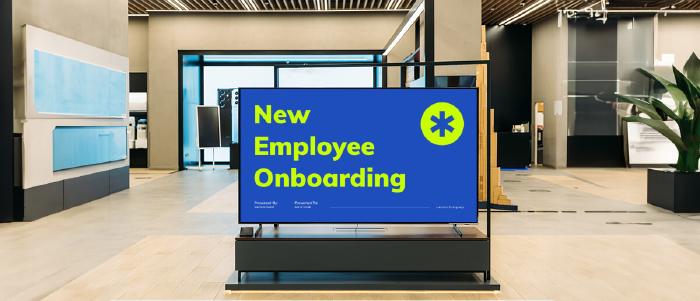
Nov 20 2024
8 min read

In the 2024 business outlook, cultivating a unique identity is imperative for enterprises striving to differentiate themselves within a competitive milieu. With the advancement of technology, digital signage has emerged as a powerful tool to amplify these branding efforts. This blog post explores the synergy between brand reputation and digital signage and how it can transform how businesses engage with their audience. Read on.

Corporate branding via digital signage refers to using electronic display technology to promote and reinforce a company’s identity and values.
Want to learn more about corporate digital signage? Check this out
This involves displaying brand-related content such as logos, color schemes, and thematic messaging on digital screens in various locations, aiming to enhance brand recognition, communicate corporate culture, and engage employees and customers with consistent and impactful visuals.
The key is consistency, creativity, and customization. Let’s see how this works.
Use digital signage to display logos, color schemes, and design elements consistent with your brand’s visual identity. For instance, Apple stores use minimalistic design and consistent imagery across their digital displays to reinforce their brand aesthetic.
Leverage digital signage to tell engaging brand stories. Coca-Cola often uses creative e-narratives to evoke emotional connections with its brand.

Tailor digital signage content based on location. Fashion retailers, like H&M might showcase different clothing lines on digital signage in stores located in varying climates or regions.
Incorporate interactive elements in digital signage. For example, a car dealership could use touch screens, allowing customers to customize car models, reflecting the brand’s focus on personalization.

Real-time information display via signage screens aligns with a brand’s commitment to staying current and relevant. News networks like CNN often use digital displays in public spaces to show live news updates, reinforcing their brand as a timely information source.
Several leading companies have harnessed the power of cloud based digital signage to elevate their brand image. These case studies highlight the strategies and their impact on their branding efforts, providing valuable insights for other businesses looking to follow suit.
Mercedes-Benz leveraged digital signage to enhance internal communication and foster a cohesive workplace culture. Central to this effort was their ‘One of Us’ campaign, featuring employee-focused content and behind-the-scenes stories. Utilizing Pickcel’s solution, which was compatible with their existing Raspberry Pi devices, the company effectively deployed the solution for diverse internal communications, ranging from news bulletins to employee recognition, thus reinforcing their commitment to a strong corporate community.
PepsiCo’s revolutionized its internal communication using signage technology. This strategic implementation allowed for real-time engagement with employees, broadcasting important corporate news and schedules, and celebrating staff achievements. This approach streamlined communication and reinforced PepsiCo’s brand values and mission, creating a more connected and informed corporate environment.
The benefits of digital signage in improving your brand image are numerous and impactful. Here are the seven most important ones.
Offers a dynamic platform for displaying brand elements, making the brand more visible and recognizable.
Ensures uniformity in brand messaging across various locations, contributing to a cohesive brand experience.
Digital signage allows for easy updates and customization of messages, keeping content relevant and targeted.
Interactive features of digital signage engage customers more effectively and provide valuable feedback through interaction data.
Helps in projecting a modern, tech-savvy image of the brand, appealing to contemporary consumers.
Reduces the need for traditional physical marketing materials, lowering overall advertising costs while offering high-impact visual communication.
By transitioning to digital formats, companies can reduce paper waste associated with traditional print advertising, aligning with eco-friendly business practices.
Incorporating e-branding offers significant benefits but poses some challenges. These include:
Implementing and maintaining digital signage technology can be complex, requiring technical expertise to ensure smooth operation.
Developing and updating content consistently across various platforms demands a robust management strategy.
Maintaining uniformity in branding across different digital signage setups is crucial but can be challenging, especially in large-scale deployments.
Initial setup and design of digital signage systems can be expensive.
Keeping up with rapid advancements in digital signage technology to stay relevant can be demanding.
Digital signage has revolutionized the way businesses approach image building. By leveraging this dynamic medium, companies can create more engaging, memorable, and effective experiences. As technology continues to evolve, the potential for innovative branding through digital signage only grows and goes forward!

Nov 20 2024
8 min read

Sep 11 2024
7 min read

Feb 8 2024
4 min read

Dec 8 2023
8 min read
Take complete control of what you show on your digital signage & how you show it.
Start Free Trial Schedule My DemoSee How Mercedes-Benz Streamlined Internal Communication and Boosted Engagement by 32% using Pickcel
Unlock Exclusive Insights